Iranian Authorities Prevent Mahsa Amini's Family From Leaving Country

The family of Mahsa Amini, set to receive the Sakharov Prize from the European Union, were not allowed to leave Iran for France for the award ceremony.

The family of Mahsa Amini, set to receive the Sakharov Prize from the European Union, were not allowed to leave Iran for France for the award ceremony.
Mahsa Amini, a 22-year-old woman, was apprehended by Iran's morality or hijab police on the street in mid-September 2022. Within hours, she was transported to the hospital with critical head injuries, ultimately succumbing to the trauma three days later. The incident swiftly ignited widespread protests across the nation.
Mahsa Amini's father, mother, and brother were informed at Imam Khomeini Airport that they were prohibited from leaving the country, and their passports were confiscated.
The European Union had announced on October 19 that Mahsa Amini, along with the Women, Life, Freedom movement, would be honored with the prestigious Sakharov Prize.
The Amini family has been under intense pressures from security forces since Mahsa's death. similar to intimidation and gag orders enforced by Iranian intelligence against other families whose young members were killed by the government.
On the anniversary of Amini's killing, her father was temporarily detained on September 16 by security forces for intimidation purposes. Following threats and warnings, he was eventually released. Reports from social media and local Kurdish sources suggested that Amjad Amini, Mahsa's father, faced restrictions on leaving his house for a certain period.
Amjad Amini and his wife, Mojgan Eftekhari, had earlier called for a gathering to commemorate the anniversary of Mahsa’s death at her gravesite in a cemetery in Saqqez, west of Iran.
Iran International received information that Amjad Amini was summoned multiple times by the Saqqez Intelligence Office after announcing the ceremony marking his daughter's death, undergoing hours of interrogation.
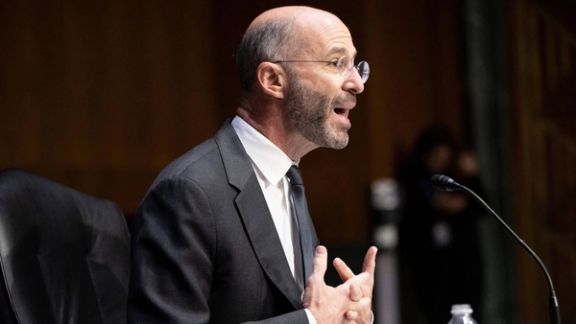
A US lawmaker has requested easier access to information concerning the suspensions of officers in the executive branch, including former Iran envoy Robert Malley.
Malley was quietly removed from his duties in April as first reported by Iran International, apparently for mishandling restricted information, but the Biden administration has so far refused to disclose any details.
Republican Congresswoman Claudia Tenney introduced the ROBERT MALLEY Act on Thursday, which requires "the heads of executive agencies to disclose, upon request, relevant information to congressional committees regarding the furlough or indefinite suspension of employees."
Malley served as the Biden administration's special envoy for Iran until late April 2023, when he had his security clearance suspended and was placed on unpaid leave without explanation. Iran International first raised the issue of his long-term absence in June.
In September, Iran International and Semafor exposed a large Iranian influence operation in Washington.
The reports revealed that former Iran envoy Robert Malley's associates published op-eds, appeared on news channels, and even sought approval for their public appearances to promote the Islamic Republic's nuclear program.
In October, the US House Oversight Committee announced that it intended to subpoena Robert Malley as part of its investigation of US policies towards Iran.
The committee alleges that the government has obstructed Congress' repeated attempts to determine the reasons behind the revocation of Malley's security clearance by US Diplomatic Security two months before he was placed on unpaid leave.
Additionally, the committee is seeking records relating to one of Malley's aides, Ariane Tabatabai, and her involvement in the Iran Experts Initiative, a program intended to promote Iran's perspectives on nuclear negotiations.

Johan Floderus, a 33-year-old Swedish citizen and EU diplomat, has been held captive in Iran for the past 18 months, prompting his family to speak out about the severe conditions he faces.
With no routine consular visits or phone calls during his 600 days of detention in Tehran's Evin prison, Johan has resorted to hunger strikes at least five times, as revealed by his father, Matts Floderus.
Matts detailed the dire circumstances Johan is enduring in an interview with The Guardian. According to him, Johan is confined to a cell without a bed and compelled to sleep under constant lighting. Routine access to phone calls, books, and essential food supplements has been consistently denied.
Expressing the family's distress, Matts shared his wife's hope for Johan's release in time for Christmas, highlighting the devastating impact of the situation on their lives. He emphasized Johan's arbitrary detention, stating that he has committed no wrongdoing and should be released to leave the country.
He said the Iranians had “taken Johan for no reason” and “should ensure he has full human rights while there and they should release him and let him leave the country right away”.
Iran routinely arrests foreigners and dual citizens to use them as bargaining chips against Western countries. The United States released $6 billion of Iran's blocked funds this year to free five hostages.
Johan, an alumnus of Oxford, previously worked on the Afghanistan desk of the EU’s external services department. He was detained on April 17, 2022, in what seems to be a deliberate strategy by Iranian authorities, possibly aimed at leveraging his release against Iranian prisoners in the West or extracting financial concessions.
Johan's family awaits an imminent court hearing in December to learn of the charges against him.

Iran-backed militias in Iraq and Syria launched 10 fresh attacks on US targets Friday, as Tehran uses its proxies in the region to pressure Washington.
The militias have carried out more than 80 such attacks since mid-October, when Israel’s onslaught on Gaza began. But the Biden administration has largely avoided retaliation, drawing stark criticism from Congressional Republicans.
“How many attacks on American personnel and facilities by Iranian-backed militias in Iraq and Syria will be tolerated before we hold Iran accountable,” Senator Lindsey Graham asked on his X account.
“We have lost all deterrence as a nation,” he said. “The Biden Administration is letting our men and women in uniform down and putting them at risk by not challenging Iran directly.”
The Biden administration has been trying to avoid conflict with Iran ever since Hamas forces attacked Israel, fearing that the war on Gaza could expand and set the whole region ablaze.
Secretary of defense Lloyd Austin spoke Friday with the Iraqi Prime Minister Mohammed Shia al-Sudani reminding him of Iraq's obligation to protest diplomatic missions and "Coalition advisers and facilities." He emphasized that the US reserved the right to self-defense.
The attacks Friday were a mix of drones and missiles, targeting American bases and the US embassy in Baghdad –a first since October, marking a clear escalation of operations by Iran proxies in Iraq and Syria, who seem to have taken over from Houthis in Yemen.
The Houthis robbed the spotlight last week with several attacks on commercial vessels in the Red Sea and forcing two US warships to engage.
A senior White House official blamed Iran’s Revolutionary Guards (IRGC) for Houthi actions.
"We believe that they are involved in the conduct of these attacks, the planning of them, the execution of them, the authorization of them and ultimately they support them," deputy national security adviser Jon Finer said.
He added that the Biden administration has “not ruled out the possibility of taking military action” against the Houthis.
On Friday, Bloomberg reported that the administration “has been consulting with Gulf allies about potential military action” against Houthis.
The report suggested that the talks were at a “preliminary stage” and both the US and partners still favored diplomacy over direct confrontation, especially since any military action can jeopardize the renewed relationship between Iran and Saudi Arabia, which the Biden administration values as essential to the peace and stability in the region.
It seems unlikely, however, that the regime in Tehran or its regional proxies would change course unless they felt the heat.
“Retaliate yes and soon but the target must be something dear to Iran,” said Douglas London, a former CIA expert and a non-resident scholar at the Middle East Institute’s Countering Terrorism & Extremism program. “Little value in hitting the Houthis or Iraqi proxies apart from capability reduction since their casualties are expendable to Iran.”
The hardliners in Iran –including the Supreme Leader Ali Khamenei himself –believe the recent events to be in line with their interests and their long-term vision for the region.
The ongoing attacks in Iraq, Syria, and the Red Sea are likely intended to push the Biden administration to call for a ceasefire in Gaza. But they may also be intended to wreak havoc in the region, shifting American public opinion and eventually forcing US troops out or at least diminishing their presence.
In all this, the confusion and the dithering of the Biden administration can play the role of an unintended catalyst.
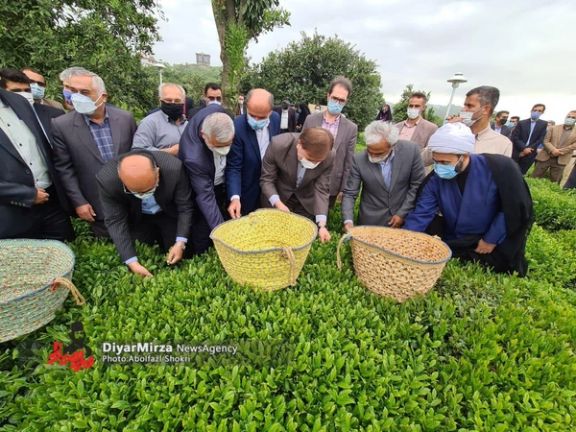
Iranian media is still buzzing with the unfolding details of a colossal corruption case involving nearly $3.5 billion and key Islamic Republic figures.
The number of officials implicated in the case is so high that the blame game has become very complicated. Iran’s economy is plagued by corruption cases that seem systematic and often work like this: An official with a network of other regime insiders manages to secure foreign currency for international trade at discounted government rate and then sells it in the black market.
Whenever such cases are revealed, the authorities usually cope out of responsibility by blaming former administrations or officials from the opposing political camp. However, the $3.5 billion embezzlement case of Debsh Tea Company involves officials from both the current and the previous presidential administrations -- including ministers of agriculture, industry as well as the governors of the Central Bank of Iran and the chiefs of Iranian Customs Administration. It has also led to discord between the judiciary and the presidential administration as well as the parliament.
Apart from the accusations of corruption between reformist and conservative factions, the government and the judiciary also disagree on how to manage the scandal. President Ebrahim Raisi has called for this case not to become "political," a code in Iranian politics for burying an issue. Raisi called for the coverup after reports revealed his administration’s part in the case. Some reports say that until 2020 the annual budget allocated for importing tea was around $300 million, but the budget suddenly tripled in 2021 without any justification. Iran International has also learned that former Agriculture Minister Javad Sadatinejad, was removed by Raisi in mid-April in relation to the case.
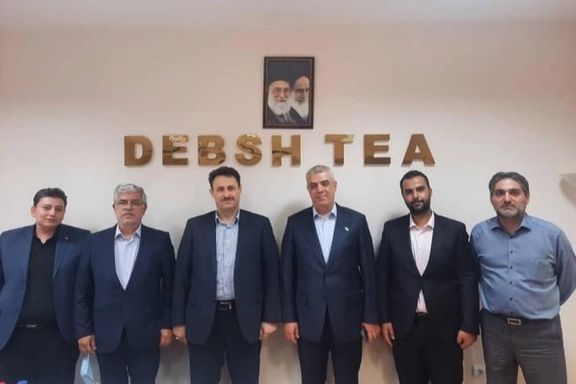
Debsh company, handling most of the country's tea imports, received a staggering $3.37 billion in foreign currency from the government on a preferential exchange rate for tea and machinery imports from 2019 to 2022. However, it has allegedly sold $1.4 billion of the currency on the free market at a higher rate. The company also sold low-grade tea imported from Kenya as high-grade tea originating from India, with a $12 difference per kilogram. The company has been also involved in what has been described as fraud by re-importing cheaper Iranian tea and pocketing the difference in foreign currency.
Iran’s Chief Justice Gholam-Hossein Mohseni-Eje said Thursday that "The government has reported the dismissal of 60 individuals in this case, but these individuals have not been named." A few hours later, government spokesman Ali Bahadori Jahromi said that the dismissal of 60 managers in the past two years is not only over this particular case. Jahromi said earlier this week that several low and mid-ranking officials have been arrested over the case. The CEO of the company, Akbar Rahimi, is reportedly under arrest too. No reports about the details of these arrests and dismissals have been shared with the media and it is not even known if any court hearing was held.
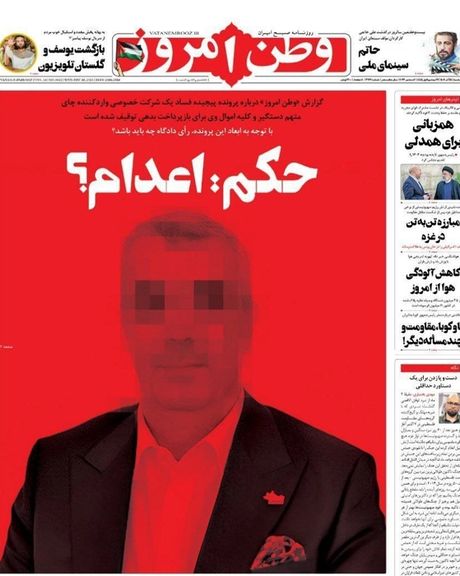
Although top officials, including Supreme Leader Ali Khamenei, claim that corruption in the country is not systematic, the case of Debsh tea company could not have been allocated $3.5 billion while the total consumption of tea barely hits $300 million. According to former editor of conservative Kayhan daily, Mehdi Nasiri, such a large amount of corruption is not possible in Iran without the involvement of top officials and Khamenei's office.
The scandal has enraged Iranians who are suffering from a wide range of economic problems as well as shortages of medicines and some food items as the government has failed to lower inflation, currently above 50 percent.
Iran's top Sunni cleric Mowlavi Abdolhamid said during his Friday sermon that Islamic Republic officials acknowledge the extensive prevalence of corruption, which has reached a point where they are unable to curb or eradicate it. He stressed the necessity for fundamental changes to combat corruption, echoing the people's outcry that past policies have proven ineffective. The outspoken leader of Iran's Sunnis referring to the tea scandal said, "Corruption has become so widespread that some have dared to embezzle this amount for themselves."
Underlining that such a huge corruption case is not possible without the knowledge or coordination of senior officials, reformist Etemad newspaper says, “The main problem is that, aside from a general headline, no details have been released about the highest authorities involved.”
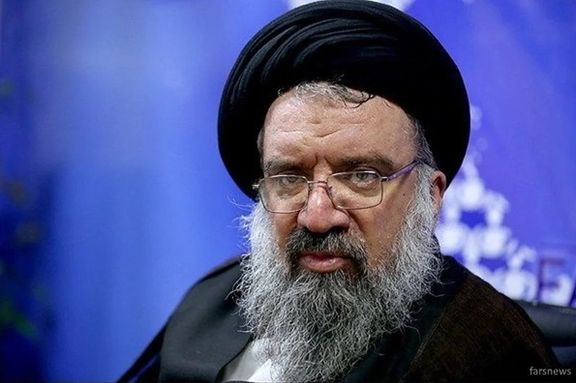
Senior cleric Ahmad Khatami has justified attacks by the militant group against Israel as a legitimate form of defense, speaking in a Friday prayer sermon in Tehran.
Khatami claimed such action aligns with the teachings of the Quran, saying: "May God bless your hands! Strike Israel because your striking is worship."
The sermon comes as tensions in the Middle East escalate amid the ongoing Hamas-Israel conflict, which began two months ago.
Iranian authorities have been issuing a series of inflammatory statements in recent weeks, warning both Israel and its ally, the United States, of the response should attacks on Gaza persist.
The Friday prayer leader in Mashhad, Ahmad Alamolhoda, echoed the words of his counterpart in Tehran, saying: "Fortunately, today the resistance movement has encompassed the majority of the region, and we witnessed the resistance's attacks on Israel during the Gaza war."
Commenting on the global impact of the “Al-Aqsa storm”, as the October 7 massacre by Hamas of around 1,200 Israelis has been dubbed, Alamoldha said: "Today, the whole world realized that America is a child killer and a devil regime."
Alamolhoda holds a significant position as the Supreme Leader Ali Khamenei's representative in Mashhad, a city of high Shiite importance. He is also the father-in-law of President Ebrahim Raisi, who assumed office in 2021 after being handpicked by Khamenei in a tightly controlled electoral process.